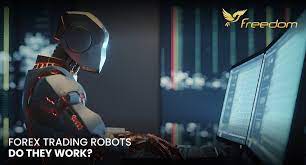
In the ever-evolving landscape of financial markets, technological advancements have brought about a revolution in the way traders operate. Among the innovations, one particularly notable development is the rise of Forex robots, also known as Expert Advisors (EAs) in the realm of foreign exchange trading. These automated systems have forex robot attention for their potential to streamline trading processes, minimize human error, and execute trades with remarkable efficiency. But what exactly are Forex robots, how do they work, and what are the implications for traders? Let’s delve into this intriguing domain.
What Are Forex Robots?
Forex robots are software programs designed to automatically execute trades on behalf of traders in the foreign exchange (Forex) market. They are based on predefined algorithms and trading strategies, meticulously crafted to identify potential trading opportunities and make decisions accordingly. These algorithms are typically created by seasoned traders, mathematicians, or programmers, drawing from various technical indicators, historical data analysis, and market conditions.
How Do They Work?
At the core of Forex robots lie sophisticated algorithms programmed to interpret market signals and execute trades based on predefined parameters. These parameters could include specific entry and exit points, risk management strategies, and position sizing rules. Forex robots operate tirelessly, monitoring price movements and market conditions round the clock, enabling traders to capitalize on opportunities even in their absence.
The functionality of a Forex robot largely depends on the underlying trading strategy it employs. Some robots may focus on trend-following strategies, aiming to ride the momentum of price movements, while others may adopt countertrend approaches, seeking to identify potential reversals in market direction. Additionally, some robots may integrate fundamental analysis factors into their algorithms, considering economic indicators and news events to inform trading decisions.
Advantages of Forex Robots
- 24/7 Trading: Forex robots operate continuously, allowing traders to capitalize on opportunities across different time zones and market sessions without the need for constant monitoring.
- Emotion-Free Trading: Emotional bias can cloud judgment and lead to impulsive decision-making. Forex robots execute trades based on predefined rules, eliminating emotional factors from the equation.
- Backtesting and Optimization: Before deploying a Forex robot in live trading, traders can conduct extensive backtesting and optimization to evaluate its performance under various market conditions and fine-tune parameters for optimal results.
- Efficiency and Speed: Robots can execute trades with lightning speed, ensuring prompt reaction to market movements and minimizing slippage.
Challenges and Considerations
While Forex robots offer enticing benefits, they are not without challenges and considerations:
- Over-Optimization: Excessive fine-tuning of parameters during backtesting may lead to over-optimization, where the robot performs exceptionally well on historical data but struggles in live trading due to changes in market conditions.
- Market Volatility: Rapid changes in market dynamics, particularly during high-impact news events or geopolitical developments, can pose challenges for Forex robots, potentially leading to unexpected outcomes.
- Monitoring and Maintenance: Despite their autonomy, Forex robots require periodic monitoring and maintenance to ensure optimal performance, including software updates, strategy adjustments, and risk management oversight.
- Lack of Adaptability: While some robots may feature adaptive algorithms capable of adjusting to evolving market conditions, others may lack flexibility, leading to suboptimal performance during periods of market turbulence or regime shifts.
Conclusion
Forex robots represent a compelling tool in the arsenal of modern traders, offering the promise of automated trading with efficiency and precision. However, their effectiveness hinges on factors such as the robustness of underlying algorithms, prudent risk management, and adaptability to changing market dynamics. While Forex robots can enhance trading workflows and potentially yield favorable returns, it’s essential for traders to exercise diligence, conduct thorough research, and exercise caution in their deployment. When used judiciously, Forex robots can serve as valuable allies in navigating the complexities of the Forex market, empowering traders to capitalize on opportunities while mitigating risks.